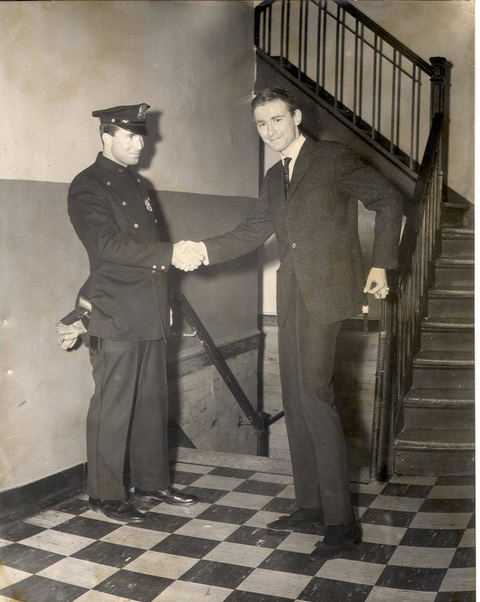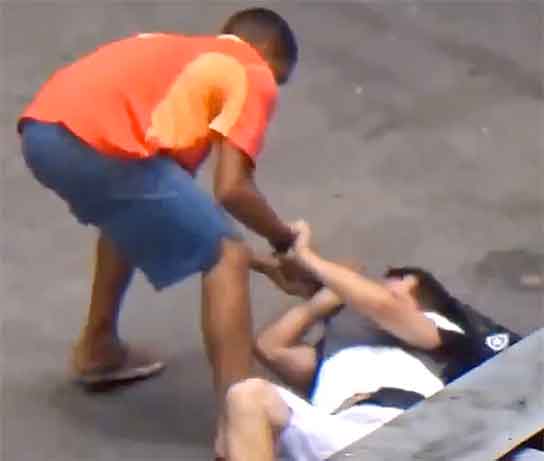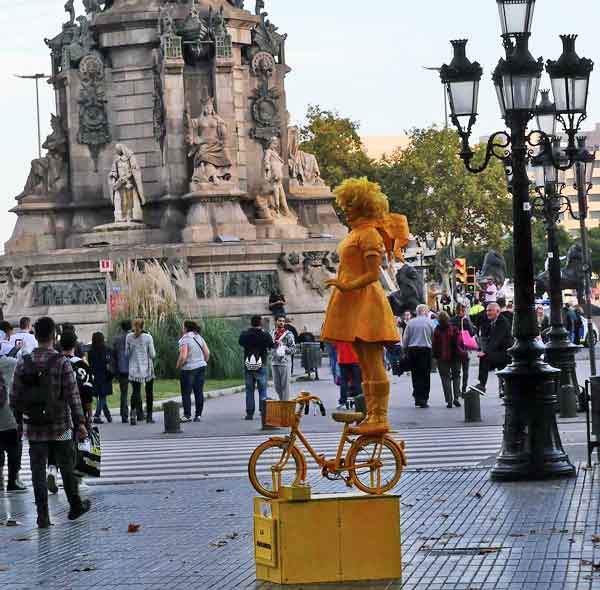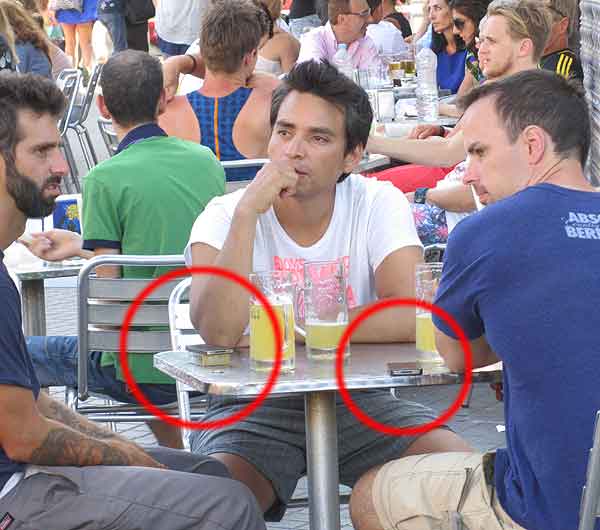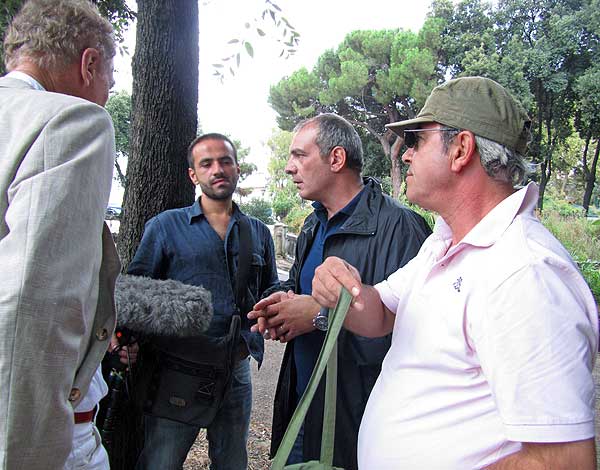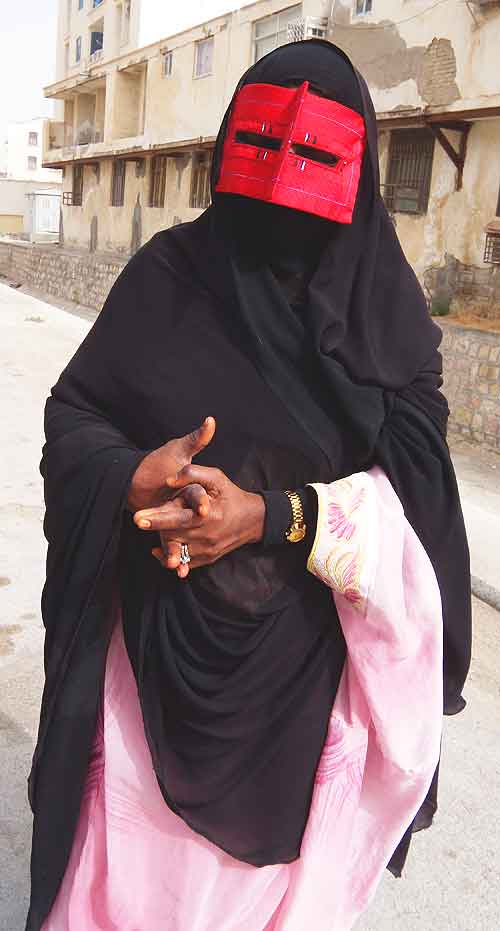I still feel my choice to become an American many years ago was the correct one.
Continue readingPickpockets in Rio — Anti-theft rules
Anti-theft Rules for Rio
How to Protect Yourself from Street Thieves and Muggers
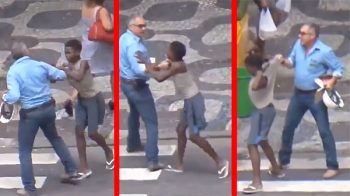
“Be more vigilant; be aware of your surroundings,” warn US government agencies to travelers heading to Rio. Be aware of pickpockets in Rio.











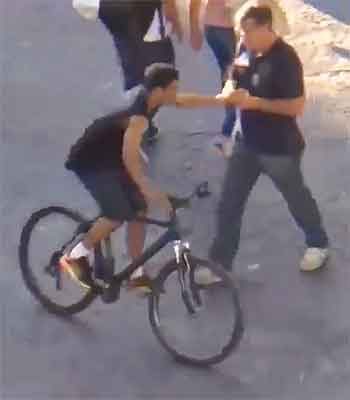

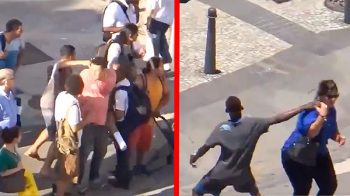
But what does it really mean: “be more vigilant”? That advice seems to be given on a daily basis now, whether about visiting France, attending the Olympics in Rio, or a music festival anywhere.
Robbed in Rio
How should the ordinary citizen become more alert, more aware, and more vigilant nowadays? What does that even mean?
Well, consider where you are, first, and the specific risks, whether you’re on a Mediterranean cruise, or in a club in Paris, or on a beach in Rio. There are smart tactics useful for all those places.
[Edited to add: The New York Times reports on 8/8/16 that “there were nearly 11,000 street robberies in June” this year—and that’s only reported street robberies!]
Pickpockets in Rio
Pickpockets in Rio are not seasoned criminals—many are simply street urchins, teenage muggers, and simple pickpockets looking for an opportunity. They are the homeless piraña kids who have little to fear from law enforcement, and behave like pack animals, circling their prey in perpetual motion, looking for a new easy score. They are looking for another uninitiated mark who simply doesn’t understand the risk.
A perfect mark or an inexperienced tourist gives off signals which the perps pick up on. Their internal computer tells them this looks easy, no danger of getting caught, and I can sell that iPhone to a fence in less than thirty minutes. Easy work.
You can minimize the risk of a bad experience by following a few ground rules and understanding who your opponents are. Here are three fundamental rules to put into daily practice, in Rio and elsewhere.
Anti-theft Rules for Rio
1. Don’t give off the signals that identify you as their next meal ticket.
The most obvious behaviors to avoid not just while in Rio, but in many summer destinations:
•Dress down, do not wear an expensive watch or any jewelry, and especially not a gold chain or necklace. Thieves stealing watches do not use tricky moves to open buckles as in a Las Vegas stage show. They grab it and rip it off, breaking the strap. Do not think that a Rolex is safe because of its sturdy metal strap or double latch. Thieves in Rio are experts at twisting a Rolex face to break a pin in the strap, which is the weak point in a Rolex watch strap or bracelet.
•Under no circumstances should you hang an expensive camera around your neck.
•Don’t use an iPhone in public.
•Don’t use an ATM unguarded. If you must use an ATM, carefully analyze the location, and look for scruffy individuals in near proximity.
•Do not carry a wallet or credit cards in a slanted front pants pocket which gapes an bit when you walk. Pickpockets in Rio operate with speed, not finesse. The tighter the pockets, the harder it is for the thieves. Crowded public transportation is common setting for pickpockets almost everywhere during the summer.
•Walk far from the curb on a busy street, to avoid marauding scooter thieves who snatch bags from shoulders or hands. When it’s dark, walk against the traffic and away from the curb. Wise Europeans already know to wear their back packs in front when walking in public.
•Sitting in a public bus, tour bus, tram, or train requires extra care. If you sit next to an open window, watch out. When the bus is still or creeping in traffic, aggressive kids jump up to grab a phone within reach, or leap onto the tire to reach inside the window.
There are tons more travel safety tips, but if you follow these suggestions above you have already eliminated the most common thefts in Rio.
2. Understand how and when to be defensive and when to be passive.
•Should you fend off a bare-chested youth who grabs something from you or attempts to mug you or your significant other? If it’s broad daylight and there are lots of people around, being forceful is generally fine. That means getting into a low position with good balance and watching your back for an attack from behind. The darker it gets the harder it is to evaluate the confrontation. Is it a team mugging you? How many are they? Each scenario requires different advice. A gang of muggers will often have one member with a weapon of some sort, usually a knife. They’re not seeking to harm you physically unless they are cornered or counter attacked.
•Don’t expect bystanders to step in and assist you. There is a dislike in Rio between the wealthy and the street kids—a class conflict between the rich (you, the tourist) and the not-so-rich. The general public will seldom come to your aid or interfere for fear of their own safety.
•Being cut or knifed in broad daylight is not common, but if you do hold on to a thief and shout for police, his buddies may quickly appear to help him. More common are attacks by single operators—a poorly dressed young male with bare chest and flip-flops or bare feet.
•The more sophisticated pickpockets in Rio use entirely different techniques. You avoid them and becoming their victim by using travel pouches hung inside your pants from a loop that your belt goes through. All online travel-accessory stores sell various inexpensive models. Those that hang under your shirt from a string around your neck are not sufficient in Rio.
3. Pro tips: Minimize the risk by identifying the perps early, and getting out of their line of sight.
•Sensing the approach of a mugger is half the battle.
•Try to stay on major streets and don’t deviate into unknown territory. Plan your itinerary and your exact routes. Ask your tour guide or the hotel staff if your route is safe to walk and what to avoid. But realize the scene changes drastically from day to evening to night.
•Muggers will often stand out by moving irrationally and not fitting into the scene. But this does not mean that every poor youngster is a criminal; it just means that you must observe your surroundings all the time, especially behind you. If you sense that a suspect (or a gang) is closing in on you—think National Geographic animal kill documentaries in Africa, predators circling their prey—get yourself into a defensive position, and certainly try to move away from a location where you are vulnerable.
If you’ve read this far, you’ve got to see this video. It’s theft after theft in Rio, some successful, some only attempts. Watch the utter nonchalance of the thieves, and of some of the victims, too.
https://www.youtube.com/watch?v=Atbbjjqo_dM
Robbed in Rio
Barcelona pickpocket scene today
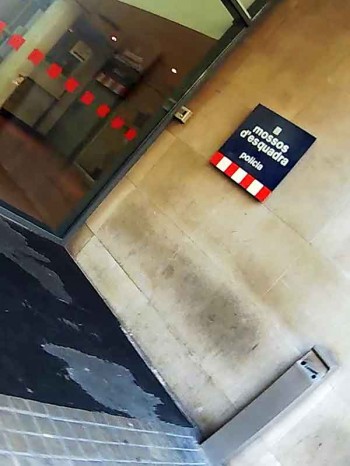
In my previous post, I offered seven simple rules to save yourself from pickpockets, inspired by my research into the Barcelona pickpocket scene today. Although they are presented with Barcelona in mind, the rules are good practice for most travel to areas unfamiliar to you, or when visiting areas known for pickpocket action.
You can avoid almost all of the most common pickpocketing methods if you follow those seven rules. Remember, the thieves read you and go for the least aware. They’ll head for the easiest opportunities. Don’t make yourself easy picking. It’s easy to defeat these pickpockets. The locals do.
In late October 2015, I spent several days updating our knowledge of the Barcelona pickpocket scene today. As I recently noted, our research is tedious and methodical. Here, I will present a few key findings from my research.
Barcelona pickpocket scene today
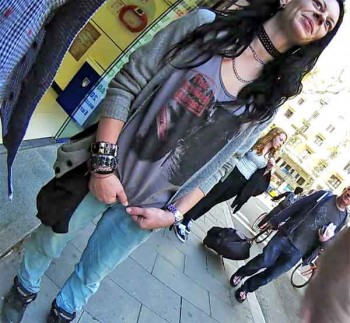

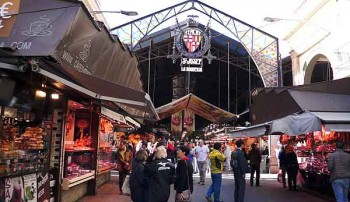
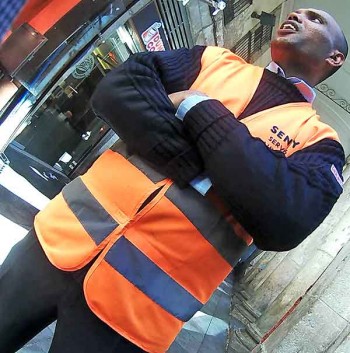
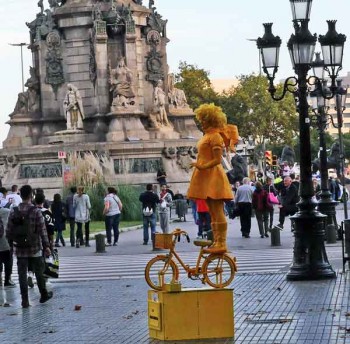
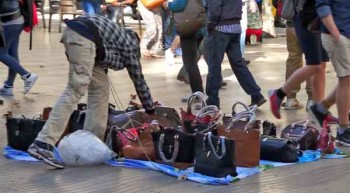
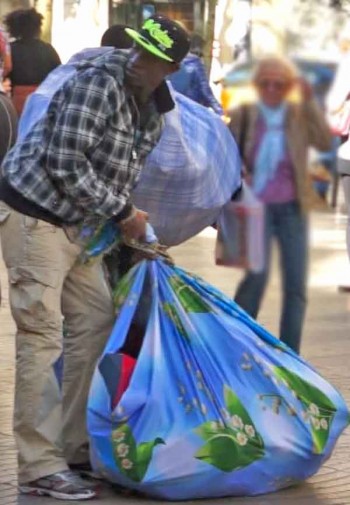
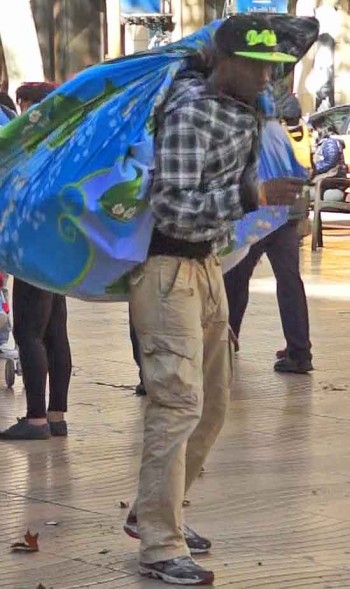
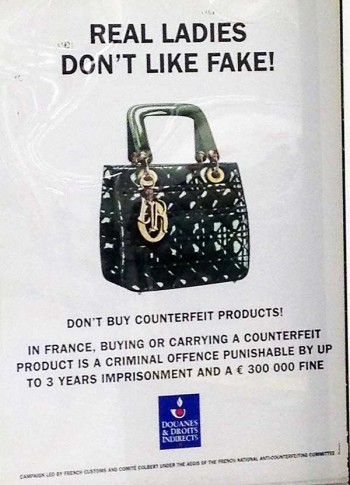
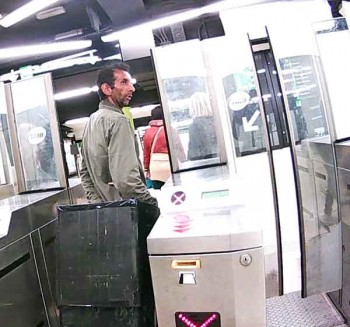
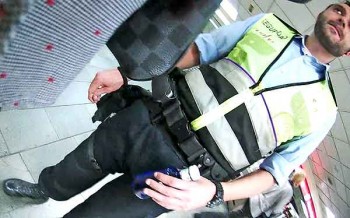
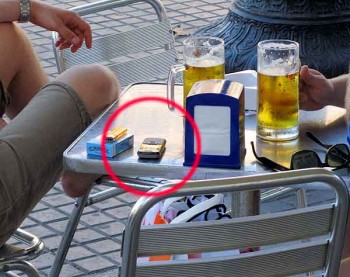
Police intelligence
I had several conversations with the local police. This is always tricky in Barcelona. Language barriers, rules from above to be tight-lipped, and to what extent they even know the average daily incident rate. We know that the real number of thefts is at least three times higher than the official one, since only one in three (at best) will bother to go to a police station and file an official report. The (vast) majority of victims chalk it up to a bad experience or a good lesson. C’est la vie.
Theft numbers are slightly down compared to years past. This is something I can confirm from chats I had with many hotel front office staff, restaurant managers, and people who work in areas where we’ve seen plenty of pickpocket action in the past. What my police friends could not explain was the reason for the downturn. It appears that the number of plainclothes (undercover) officers out in the field is the same as before. One good guess is that the majority of tourists now know before they arrive to be alert. Word is out. People are therefore more cautious.
Sexy pickpockets
But there was also some negative news. I was told that there are 50-100 female prostitutes operating in Barcelona who are more pickpocket than partner to lonely men. I thought this development was a bit peculiar, but I can see how the majority of these victims would not rush to the nearest police station to report a robbery. With this little nugget I began my own research. No, I didn’t hire a pro to get the goods (on camera), but I did strike up conversations with women who would know, including a few who did proposition me in the evening on La Rambla. One told me: “A third of the girls are simply doing tricks, and a third turn tricks and do pickpocketing. The final third are ladyboys who do only pickpocketing.”
There are a number of streets and regions in Barcelona where this action is rampant. And the women (and men) are extremely aggressive. Watch out!
Markets
My next stop was La Boquería, the hugely popular market just off La Rambla, full of fabulous small food stalls with exquisite Catalonian fruits, nuts, Iberian hams, chocolate, fresh seafood, flowers, and temptations galore for food lovers. The market is always crowded and always fun to stroll through at any time of the day.
And yes, there is pickpocketing there. But not as much as one would think. The market is concerned with security and its reputation and therefore hires guards. But not every entrance is controlled and the thieves know the weaknesses of the system and camera positions. Various stall owners or managers told me about the frequency of the thieves and when it is most likely to have an encounter with them: Friday or Saturday, paydays with many customers carrying cash, and especially crowded. My additional suspicion: maybe slightly less police presence on Saturday. Most thefts are from women’s handbags or from older people less alert to their surroundings and their pockets.
Ronaldinho technique
I also saw some of the classic pickpocketing moves late in the evening right on La Rambla, which otherwise is fairly safe since it’s constantly patrolled by officers in uniform (far more than in the past). Around 11 PM I saw the old Ronaldinho football stunt tried on a man in his twenties, maybe slightly tipsy, but the mark realized what was going on and just barely escaped the attack. In years past I would recognize various pickpocket teams crossing La Rambla late in the evening, but this time I saw no evidence of these punks. The bar scene is where one has to be most vigilant nowadays in Barcelona, and when taking the underground Metro.
The bottom of La Rambla still has the living statue performers, but only on the first two hundred meters or so. There was no evidence of the “three-shell gamers” who have otherwise infested La Rambla. Clearly an improvement and a clean-up process. The crowds that always form quickly around these con men are ripe pickings for the pickpockets.
Counterfeit-sellers
In their place Barcelona and especially La Rambla has been invaded by replica hustlers, small teams of men from West Africa who sell counterfeit handbags, fake brand name clothes and sport shoes, laid out on sheets spread on the ground. Of course all of Europe is plagued with this phenomenon, and wonders how to deal with it. It is illegal. If one approaches this from an elitist viewpoint it is trashy, cheap, and blocks pedestrian passage on otherwise nice streets. From a different angle, one can say these immigrants are trying to survive with a trade and it seems that buyers are eager and willing to find bargains on name brand luxury goods, whether legitimate or copy.
However it is illegal and in some countries, foremost among them France, authorities take a very serious stance on anyone buying or possessing counterfeit products. And so the hustle continues—a cat and mouse game in which the police sweep down on the culprits and the hustlers pull strings attached to the corners of their display sheets, instantly morphing the spread into a huge swag bag containing all their contraband, slung on their backs as they dash off. These gangs have controllers or spotters who alert them that the police are approaching, just as the three-shell-game hustlers also have spotters looking out for uniformed or undercover police officers.
The replica game is huge business all over the world, but a very difficult trade to block or efficiently remove. Some locales have enormous illegal black-market replica industries; for example Italy (Naples), Turkey) (Kusadasi & Istanbul, Malaysia (Johor Bahru), Thailand (Bangkok), Vietnam and of course the major cities in China. It is especially difficult to prosecute—what really is a replica, and what is not?
Metro
I then took a few trips on the local Metro from Plaza Catalonia and witnessed first hand a few female pickpockets. They seemed to recognize me after a while, probably from the film Pickpocket King which now must have been screened by every practicing pickpocket in Europe. They did not recognize me instantly; how could they? The film is now two years old and I was doing my rounds alone in Barcelona, not accompanied by Bambi. When they left the compartment where I stood their heads did their usual tilting down, and turning while scrutinizing a male mark as he entered the Metro train. They simply could not turn off their modus operandi, looking for the next victim, and obviously tabulating their chances of going into the man’s pocket. Both females showed all the characteristic behavior, including giving me the finger once the doors to the train closed and they were on the outside. Yes, taunting me, and giving me a message: “we’re on to you, and we know what you’re up to.”
Mobile phone theft
A continuing trend, despite of Apple’s security features and the ability to block future use, is Apple-picking, the slang term for stealing mobile phones. This has grown to be a serious issue all over the world.
Smart phones, and of course especially the coveted iPhones, are a prime target for the pickpockets roaming the streets of Barcelona. Mild temperatures make outdoor restaurants popular nearly year-round and tourists at these venues let their guards down, allowing their expensive iPhones to sit in full view on tables within easy reach for any grab-and-run thief. Many factors make phones easy to steal; they’re slim; they’re usually at the top of women’s handbags for quick access, or in outside jacket pockets where a thief can easily snag them. While a wallet may be secured in a hip pocket with a button, a multi-functioning smart phone is kept easily accessible. All these little details make for uncomplicated extraction even by low-end pickpockets.
And the “high-end pickpockets” who specialize in mobile phones are as good as magicians.
Another way to gauge the pickpocketing levels in a city is to learn the number of iPhones stolen daily. It’s fairly easy to acquire this info by simply chatting with management at the local Apple store. When I visited Barcelona’s Apple store, the daytime manager told me that the average was around 80 new iPhones sold during his eight-hour shift, and of these roughly 30 were replacements of just-stolen phones. Considering those phones not immediately replaced, and additional phones sold on the swing shift, that translates to a guesstimate of at least 50 phones stolen every day in Barcelona (in late autumn). This fits in very nicely with other Barcelona pickpocket statistics and with other high-profile European capitals like London, Rome, and Paris.
Obviously these numbers are not precise. They’re estimates and averages but, as a yardstick for pickpocketing activity, quite useful. This is corroborated by the police, who state that the ratio of victims reporting the loss of phones to wallet is three to one—for every wallet stolen, three phones are grabbed.
When you consider the value of the hardware itself, the data in it (passwords and credit card numbers, addresses, access codes, etc), and the ease of grabbing it, this makes sense. In addition, victims often believe it is a futile waste of time to report a stolen wallet, which is unlikely to ever be found with its contents, vs. an expensive and identifiable mobile phone (with an IMEI or, international mobile equipment identity number), which is seen (hoped!) to have a greater likelihood of being traced and returned. Victims also may need a police report for insurance.
Conclusion
My trip to Barcelona was tied to a security lecture for regular travelers, not security professionals. I was eager to know if some of these visitors had already experienced incidents on their first days in Barcelona. I will not identify the group by name or the actual number of hearsay incidents, other than that the ratio of incidents to total number of visitors was better than in years past. In the past I have noticed an incident rate of roughly ten victims per one thousand visitors, now the numbers were significantly fewer.
In conclusion, although this is not a scientific report, I can say with confidence that the Barcelona pickpocket scene today has improved somewhat in terms of safety. Yes, there are still plenty of pickpockets operating in this charming city, but it seems not much worse than most other large cities in Europe with important attractions. What continues to make Barcelona attractive to the thieves is of course the sheer number of tourists, cheap living, and a weak legal system. The most they have to fear is a fine, rather than a lengthy prison sentence.
I reiterate the importance and success of following my seven simple rules to save yourself from pickpockets.
Seven simple rules to save yourself from pickpockets
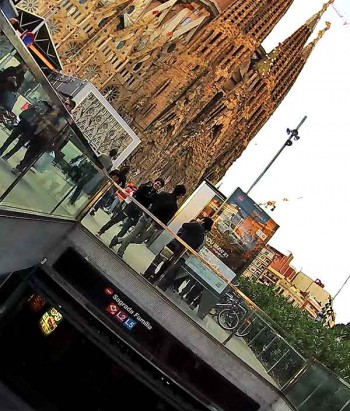
In my previous post, I discussed the tedious and methodical research we do before slamming a city for high numbers in pickpocketing, bag snatching, and/or mugging. Barcelona, sad to say, is one of those. We renewed our Barcelona research in late October 2015 and here offer seven simple rules to save yourself from pickpockets. Although these are presented with Barcelona in mind, they are good practice for most travel to areas unfamiliar to you, or when visiting areas known for pickpocket action.
Case in point: Barcelona. Its reputation for robbery has deteriorated steadily over the years, and rightly so. Television news programs and sensational newspaper stories featured every conceivable petty crime perpetrated on tourists and business visitors. Some not so petty, with women being dragged to the ground and breaking hips and arms during bag snatches. On the other hand, Barcelona is one of the most charming and pleasant destinations in the world, equally loved by young and old. Bambi and I love Barcelona, let’s make that clear, so it’s sad to have to report that crime is still very high compared to other European cities. But worst? No, I wouldn’t go that far.
One can avoid becoming a victim when visiting Barcelona and it’s not that complicated or challenging. No need for complete lifestyle changes—just a few simple precautionary steps, and you’ll increase the likelihood of a safe visit by many, many multiples.
Seven simple rules to save yourself from pickpockets
1. Pouches. Wear a small travel security pouch under your clothing (either under your shirt, or hanging by a loop attached your belt and inside your pants). This is especially important if you intend to use the local metro system during rush hours.
2. Cash. Don’t carry much cash (you decide the meaning of much)—but remember most of the small cafes and restaurants do not accept credit cards (strange but true, especially in the markets).
3. Passport. Do not walk around with your passport in a pocket. Make a color copy of the first page and carry the copy (and it’s good to have when you fill in tax refund forms, if you live outside the EU).
4. Cynicism. Don’t trust anyone who approaches in order to assist you with documents, maps, cleaning off some gooey stuff that seems to have dropped on your clothes, or even police who request to inspect your currency (they’re “pseudo cops,” fakes). Yes, it means being cynical, but also civil. The majority of people you’ll come into contact with want you to leave Barcelona thinking positively about their city. If you need assistance you’ll ask a local, who will almost certainly be kind and helpful. If you are approached by a good samaritan-type unbidden, stir up that cynicism and use caution.
5. Handbags. Don’t carry elegant handbags on thin straps which can be easily grabbed and broken, especially on the narrow streets off La Rambla. Never hang your purse or bag on the back of a chair in a public place. Neither should you place it on the floor in a restaurant. Out of sight, out of control.
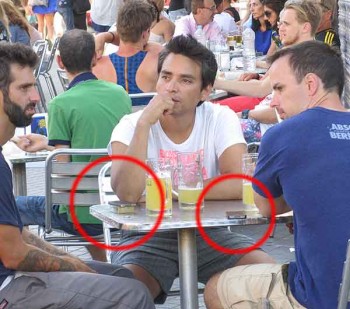
6. Mobile phones. Your mobile phone is very attractive to a pickpocket. The thieves have many techniques specifically designed to relieve you of your phone. Some of these techniques are simple, yet work effectively even on sophisticated travelers who consider themselves savvy.
7. Research. Finally, you can increase or decrease the threat factor by adjusting your behavior and your perception of the surroundings. Travel is always unpredictable, leading to delight at one moment, or knocking you off balance at another. You must be prepared, and take responsibility for your own safety and security. Research these issues before embarking on your trip. For example, search online for the most common scams and tricks that may be played on you when hitting new ground. This advice is important for every new travel destination.
You can avoid almost all of the most common pickpocketing methods and save yourself from pickpockets if you follow the seven rules above. Remember, the thieves read you and go for the least aware. They’ll head for the easiest opportunities. Don’t make yourself easy picking. It’s easy to defeat these pickpockets. The locals do.
Stay tuned. In my next post, Barcelona Pickpocket Scene Today, I will present my findings from my October 2015 research trip to Barcelona.
Worst cities for pickpocketing?
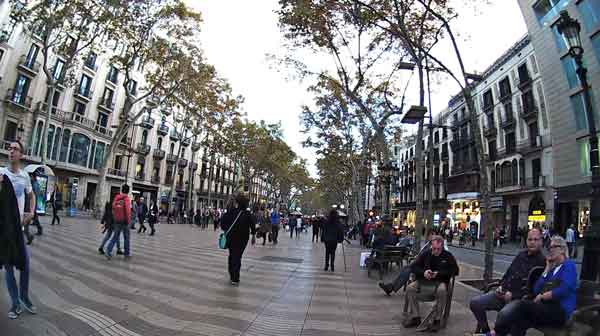
We are often asked which are the worst cities for pickpocketing. It always seems the correspondent or the journalist hopes that we will confirm a preconceived notion or rumored list of the ten worst cities where crime runs rampant. It makes for good sensational journalism, I guess, or easy-to-grasp stories and headlines. But we hate to support poorly researched lists or to disparage a particular city just because petty crime may be high in certain areas. We prefer balanced evaluations and a deeper understanding of the threat to an informed traveler.
Also, we’d hate to see a traveler dissuaded from visiting a city in reaction to one of these silly articles. The fact is, a little precaution and travel-savviness should be enough to defeat a distraction thief and stay many steps ahead of the bad guys. The key is information, which leads to an understanding of how the thieves think and act, and how they select their marks. It is always the uninformed who become the victims.
Harder to avoid are muggers and the grab-and-run thieves. They work on the principle of speed and are often brutal and vicious in their techniques. A pickpocket depends on psychological manipulation and distraction, from which you can defend yourself. But avoiding a mugger requires more planning, local research (think hotel lobby concierge), or simply staying away from certain districts. The time of day and location determine the threat factor.
Worst cities for pickpocketing
Is there any truth to those infamous lists of “the ten worst cities for pickpocketing”? That depends on what is meant by the word “worst.” Honest and accurate crime statistics are extremely hard to come by, and even the word “pickpocket” must be defined carefully. Police commissioners, local politicians, tourist ministry officials and the hotel industry in general are not fond of releasing statistics which cast a dubious sheen on their profession. It is also difficult to compare a small city like Naples to a much larger city like Barcelona, or city center districts frequented by tourists, versus an entire city and all its transportation system, including neighboring airports.
What is certain beyond any shadow of a doubt is that Paris, Rome, and Barcelona rank as high risk cities in any pickpocket list; maybe also London. So how do we measure this and how do we find the latest trends? There is only one way really, and that is feet on the ground. We revisit cities on a regular basis, usually annually, and do diligent research.
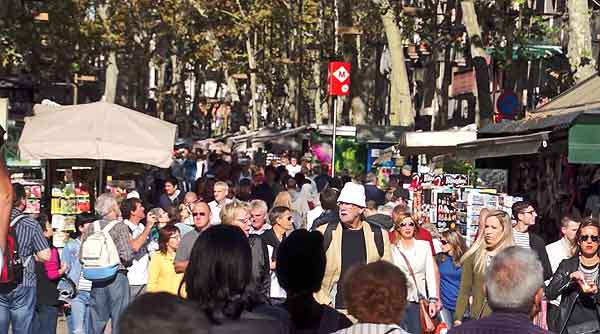
To get to the real truth we immerse ourselves for a at least a few days with law enforcement, hotel security staff, and local security experts at the cities’ popular attractions. Whenever possible, we also speak with the thieves themselves. We speak with victims on location, and those who post comments on this blog. The combined research gives us a pretty good idea of what is changing for the better or for the worst from one year to another. Tedious work, yes, but also enlightening and interesting to see how cities tackle petty crime—with aggressive new techniques or, worse, indirectly blaming the tourists themselves for not being more careful or observant. Shifting the blame!
Case in point: Barcelona. Its reputation for robbery has deteriorated steadily over the years, and rightly so. Television news programs and sensational newspaper stories featured every conceivable petty crime perpetrated on tourists and business visitors. Some not so petty, with women being dragged to the ground and breaking hips and arms during bag snatches. On the other hand, Barcelona is one of the most charming and pleasant destinations in the world, equally loved by young and old. Bambi and I love Barcelona, let’s make that clear, so it’s sad to have to report that crime is still very high compared to other European cities. But worst? No, I wouldn’t go that far.
One can avoid becoming a victim when visiting Barcelona and it’s not that complicated or challenging. No need for complete lifestyle changes—just a few simple precautionary steps, and you’ll increase the likelihood of a safe visit by many, many multiples.
Stay tuned. In my next post, I will present:
Seven simple rules to save yourself from pickpockets
And after that: Barcelona Pickpocket Scene Today.
Why pickpockets are not afraid of police
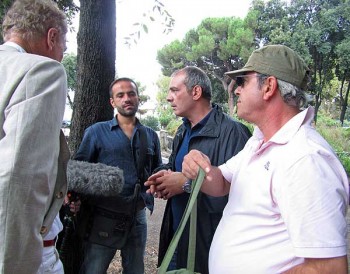
With over two million views, our 50-minute National Geographic documentary “Pickpocket King” continues to raise questions. Here, Bob Arno addresses the frequently discussed issues of why the active pickpockets showed themselves in the film, and how they feel about it now.
Few people realize that pickpockets can roam across most of Europe with impunity, not getting caught if they work in a team. Since pickpocketing is a non-violent crime a judge will seldom mete out a prison sentence when they are caught, unless a victim testifies in court and a police officer observed the act. In Italy, victims seldom testify, and certainly not in Naples. Mess with the Camorra and you stand the chance of much worse happening to you than losing a wallet.
When pickpockets work in teams one member of the troupe makes sure there are no undercover police officers nearby to witness the theft. They can usually spot the cops before the cops recognize the pickpockets—a cat-and-mouse game in extreme. Each member in the pickpocket crew has a specific duty or position during the set-up and extraction. This was not detailed clearly in our National Geographic documentary, Pickpocket King.
Most of the pickpockets in Naples are already well-known to the police (and most have served time). So those thieves who showed themselves in the film were not afraid of becoming known to the police or damaging their reputations. Maybe, just maybe, their participation in the film in fact helped them with an argument that they cooperated in spreading useful information on how people might avoid becoming victims. For the pickpockets who were on parole, their participation may even have helped convince a judge that they were trying to go straight. Yes—Naples is a charming city but also a very cynical one.
But in retrospect, all the pickpockets are unhappy today that they were featured in our film. Not because of law enforcement, but because the global success of the film on Youtube makes their work harder. Tourists know now to beware. But the pickpockets never expected the viral success of the Pickpocket King documentary.
The film teaches a traveler’s best defense against pickpocketing: know in advance what to expect and take proper precautions, especially on crowded public transportation. And then enjoy the charm of Naples and its surroundings. Bambi and I feel it is one of the greatest tourist destinations on earth because of the diversity, unique charm, fabulous food, and true warmth of the people.
Claes is kind. Claes is gone.
Bob Arno writes about his brother. Bambi interrupts.

Over the years I have written about my mentors, my old friends who have had a significant impact on my career, as well as a few obituaries — friends who were taken from us way too early. Writing about mentors is not hard, just go back in time and analyze why they were unique and how they extended themselves and helped a young inexperienced entertainer.
But today I have a far more personal challenge, in the midst of my sorrow for the loss of my own brother. He passed away about ten days ago, at age seventy. That’s far too early for a Swedish man who lived healthy, never excessive, and always in great trim shape.
Bambi: It was only two summers ago that he lifted tall Frida from the ground when she hurt her ankle on a trampoline in Arizona, and carried her like a baby a long distance to a sofa. He carried her as if she weighed nothing. In retrospect, we know that Claes was already ill, though none of us knew it. But he was still strong as an ox!
How does one explain the random selection of cancer victims? In my work I am obsessed with pattern recognition and the logic of why some people become victims (to criminals)—it’s all very neat and clear when looking at the bigger picture. But cancer can strike anyone, young or old, with little warning, as was the case with my brother. A little over a year ago he noticed he couldn’t quite swallow food as easily as before. He suspected some sort a throat infection. In September 2013 the tests came in: advanced esophageal cancer, located at the bottom of the esophagus, as well as smaller tumors in the stomach. No option to operate, only chemo therapy remained.
The doctors gave him a year, at best, and that is exactly what he got. In this year he never gave up, never resigned, but knew deep down that it was probably hopeless. He prepared as most cancer patients do for the inevitable. The legal documents, the transfer of properties, the farewell parties with his closest friends. Nobody around him suspected the rapid deterioration. Yes, his weight became an obvious red flag, but he did not look gaunt, and his face had the same round, filled-out cheeks as before. When he was in a good mood, nobody could possibly suspect that we all counted days and weeks.
My brother, Claes, lived in Sweden, where end-of-life health care is exemplary and caring. Every evening a nurse came by and hooked Claes to a drip tube, connected to a port in his upper chest close to his neck. During the night he would then receive about a liter of a milky nutritious fluid, while sleeping. Every morning the nurse returned and disconnected the tube. No, it was not good “quality of life,” since he could barely eat anything at all for close to a year. Always nauseous, and during the last six months of his life steadily more in pain, as the tumors grew and pressed against spine and sensitive nerve centers. Strong doses of morphine only sometimes helped.

So why did he maintain the illusion that maybe there was still hope for a new miracle drug? Stronger men at age 69-71 might have said “I had a good life, enough is enough, let’s not pretend anymore.” But Claes enjoyed every minute he had on the telephone with his friends, with me and my wife, and simply living another day. For 365 days when I couldn’t be with Claes, I called him daily for about an hour. We stayed with him whenever we could and behaved like we always did. Sat around the dining table and joked around, talked over current events, old anecdotes, and memories. There were lots of those and lots of laughter.
Bambi: Like that utterly believable postcard Claes sent us from Naples, pretending to be a gang of thieves thanking us for visiting Naples, and complimenting the film National Geographic made about us and them. It was brilliant, the way he mixed a little Italian in with poor English. Did Claes, with his love of all things Italian, and his reverence for the ultimate practical joke, travel to Naples just to send that postcard? It would be just like him…
But I never brought up the obvious: what do we do for Claes’s funeral, who should attend, how should we deal with this or with that? We both pushed aside the inevitable, the closure of it all. But he was not living in a dream world. He knew full well that some things just had to be done, despite the great expense in terms of his energy.
Sweden does not seem to have an end-of-life option for the patient, as is the case in the Netherlands and Switzerland. But there does not seem to be a heated dialog, either, like in the United Kingdom, about patients’ right to request a doctor’s help to terminate life. Having watched my brother suffer for a year I must ask myself why there are no choices. I’m not going to list all the horrible and painful moments my brother experienced in front of my very eyes. In retrospect, when everything is said and done, I think he still would have preferred to live just the number of days he squeezed out of his treatment and the help from the Swedish medical support system. But I would have chosen a different tack, which only means that people have different preferences and there should be an option for ALL. Not forced medical support (for whatever reason).

My relationship with my brother was unique. During the early years of my career he helped extensively with the management of promotional material back in Sweden when I was traveling around the world. But my work in the sixties was mainly outside of Sweden with few visits to my home country and so we were not as regular or intimate as in later years. Long distance phone calls in those days were costly affairs, only to be used for urgent matters. It was not until the early eighties, thirty five years ago, that I re-cemented my close friendship with my brother and we started to visit each other’s homes. Eventually this grew to extended stays on two continents, permanent possession of each other’s house keys, and “my house is your house.” We regularly visited one another for months on end.

Bambi: When in the U.S., Claes often referred to himself as an “Okie” or a country bumpkin when he felt unfamiliar with an American tradition. Like the time he drove alone to a plant nursery and his car was rushed by a gang of shouting Mexicans. Cold sweat, pounding heart, knuckles white on the steering wheel, Claes inched forward, terrified. Oh, did we ever laugh about that experience! Just a word of the story could forever after bring any of us to gales of laughter.
The friendship was equally warm between Claes and my wife. They were like brother and sister. We were a unique trio with shared interests and missed each other very much when apart. I would assume that only married couples or siblings can have the kind of close and warm relationship that years of sharing fosters. It was the humor, the jokes, the ribbing, the advice, the practical jokes, the insults, and the support, that was unique and is now missed.
Bambi: How could I not tease him about the creative way he shelved his books?
There wasn’t a dinner or a telephone chat (thank you Skype) when we weren’t laughing uproariously.
Bambi: Remember when Claes bit into a Chinese fortune cookie, made a face, and complained that there was paper in his cookie?
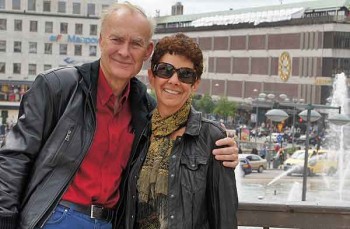
Gags or lines often in bad taste or politically incorrect, but biting and pure. No facade or pretense, just gutsy and honest observations with ever-present sardonic over-tones. Guards-down: the sort of rapport you can otherwise only have with a mate from school or the military, and hopefully with your marriage partner. (Or as they call them in Sweden “sambo.” Only forty percent of Swedish people marry—the rest live together under the label “sambo.” Never any spousal support after a break up, but child support works the same way, married or “sambo.”)
Claes had two lengthy “sambo” relations, each lasting about ten years. But he lived alone for the last fifteen years. He felt he lived full life, but regretted that he had not found a partner to share his later years with. He had a preference for exotic appearance and had relations in Latin America and the Middle East which never materialized into something that could become reality back in Sweden.
Bambi: Maybe he lived alone because of his famous stubbornness, huh? Would anyone else behave the way Claes did when airport security told him he couldn’t fly with his pocketknife? He wouldn’t give it up to the security officer, whom he knew would keep the gorgeous little knife. Instead, he was determined to destroy it. Except… it was a strong little knife, a fine German one, and he almost missed his flight because it took him so long!
His love was travel, photography, and the study of ancient civilizations (art, monuments, and history). He spent fifty years taking magnificent photos in every corner of the globe. He was a lecturer in Sweden with a strong following and his appearances always drew an adoring crowd of fans. It was not a big financial reward since culture lectures are not exactly big money-makers, but he was re-booked over and over for the same venues, year after year.

Bambi: Let’s not forget his love of tree-killing! Has any man felled more trees than Claes has? I was awed when I watched him single-handedly take down a huge mesquite in a tricky position at our Vegas house. But it was nothing compared to seeing him waving in the wind at the top of a giant fir on his country house property—a man with a fear of heights, yet! Over the years, I’ve watched his mountain of tree roots grow.
Oh, we did so much together. We gardened, we went on petroglyph-seeking road trips, we cooked. He taught me to make a killer Jansson’s frestelse. We made flädersaft together with the most old-fashioned tools.

All his friends will remember Claes for two things. His kindness and his desire to help. For many years he worked in human resources and it is amazing how many old friends have now come forward and expressed sorrow over Claes’s passing, always commenting on how much he helped them both professionally and with private trauma and complexities. He was a sensitive soul who wished well for others and always extended himself to others and their need for support.
When we were quite young, maybe about 12 years old, he wrote on a door to a tool shed that I had, “Claes is kind.”
I guess you could characterize Claes with those words—Claes is kind. I believe his friends will all remember Claes first and foremost as a kind and funny guy who passed away much too early.
Do you agree?
Bob Arno on “Pickpocket King”
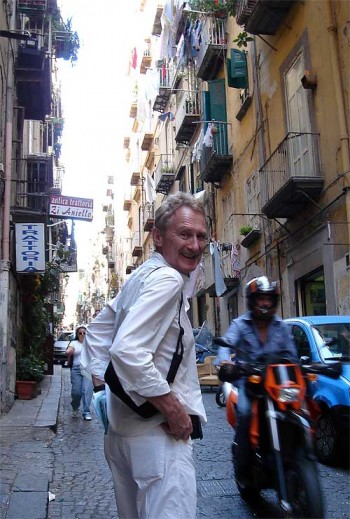
Hi, Bob Arno here. First, thank you all for passionate comments (here and here) on our National Geographic documentary, Pickpocket King.
To a certain extent the majority of these comments are right, in individual or personal observations. For example, some of you have mentioned that you have friends who have come and visited Napoli and have never experienced any trouble. And of course it’s true, you can certainly visit Naples and never see a pickpocket, and you may even take a tram from the main train station down to the port and not be brushed into.
The same observations go for other cities that have even more daily pickpocket incidents; for example Paris and Barcelona. So, one can summarize that Napoli is not at the top of the list if we are only measuring daily figures, versus per capita numbers. But it is not our point in the program, or our agenda in this blog, to prove that Naples is especially high in statistics.
Naples is unique from another angle, compared with other European cities. Its pickpocketing is concentrated within a specific region of the city and on certain public transportation routes. That is a fact. And from a technical viewpoint, Naples can be perceived as a pickpocket capital—in finesse and in execution. The pickpockets’ teamwork and coordination is extremely accomplished. I don’t think anyone wants to hear why; we are not out to glorify the pickpockets as some kind of Olympian athletes. Maybe in another post. The first raw version of the documentary, an early edit, showed more details of their skills, but this was toned down so that young and impressionable viewers would not be inspired to follow in the tracks of these thieves.
Pickpocketing in Naples often, maybe even as a rule, follows a specific and intrinsic pattern in which at least three members in a troupe operate. It’s difficult for the police to penetrate this operation, unless certain laws are changed. Laws which at present are in line with the rest of EU laws, including where there is less of this crime. For example, we might see pickpockets in Copenhagen during the summer months, but rarely with the sophistication of those who practice in Naples.
So, for those who say they see more pickpocket activity in other European cities than in Naples, that may be true for them personally, but in no way does this prove our film theme wrong. The premise (and the fact) was that we could arrive in Naples with a team of camera operators using hidden equipment and, within ten minutes on our first day out, be successfully “hit.” That is not luck; it’s an understanding of the local scene.
By the way, I’ve done television programs on pickpocketing in many cities, including Barcelona, Rome, Las Vegas, New York, Stockholm, Prague, and others. For sure, Naples has the world’s most charming pickpockets.
We hope that those who saw the film armed with preconceived notions will comment after screening the program. And let us all hope that Naples finds a social program that offers these practitioners of an old “art” some sort of re-schooling to enter society with a fresh attitude, where nobody takes advantage of another human.
Just For Laughs Comedy Tour of Canada
Today is the third day of a three-week tour across Canada with Just For Laughs. This is a blast, and very different from my usual corporate gigs. The Just For Laugh Comedy Festival is the world’s oldest and most prestigious comedy event, held every July in Montreal. It attracts major comedy talent from around the world and has grown into be a two-week global showcase of the best and rising-star comedians, very much like the Cannes film festival.
Just for Laughs now takes a show across Canada. This year the featured comics are Jeremy Hotz, Gina Yashere, Robert Kelly, Ryan Hamilton, host Frank Spadone, and me, Bob Arno. The beautiful theaters we play hold 1000 seats to several thousand. For me this is a first, and hanging with bright, talented comedians is as much fun as interacting with pickpockets in Europe, or hanging with undercover security agents in the USA. The pendulum swings from one extreme to another.
We have just concluded filming in Europe for our documentary, done a corporate event in Toronto, attended the annual convention for professional mentalists (MINDvention) in Las Vegas, and now this comedy tour. How more varied can our work be?
The first night the show got an instant standing ovation. Huge applause for each comic. Very different from performing for a corporate event, where the management and event planners are often sticklers for squeaky clean content. The extent of the censoring can be extreme, including a preview of the performer’s spoken lines to make certain that nothing may offend any sub-group among the attendees.
But a comedy tour is a very different animal altogether. Here the audience buys tickets and expects raw and cutting-edge comedy, which by nature will nearly always offend someone. The bigger the appeal or the stronger the ticket demand is, the more controversial the material may be. This tour has a sponsor — Capital One Bank — and therefore even our cast got a briefing of sorts to not embarrass our client. Otherwise we have practically free reign.
During the next couple of days we will chat with our fellow comedy team members and share what they have to say about touring, the comedy scene today in North America, where their careers are, and how to expand and climb the ladder. We will go inside the minds of some of the very best new and successful comedians out there today.
A visit to Iran
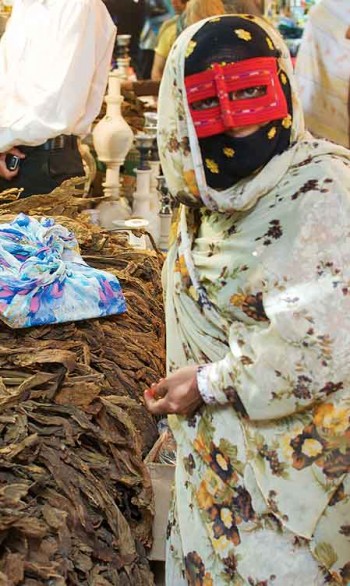
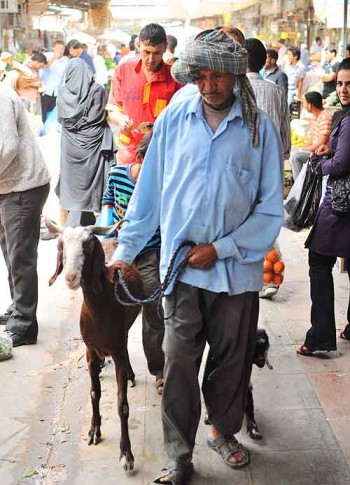


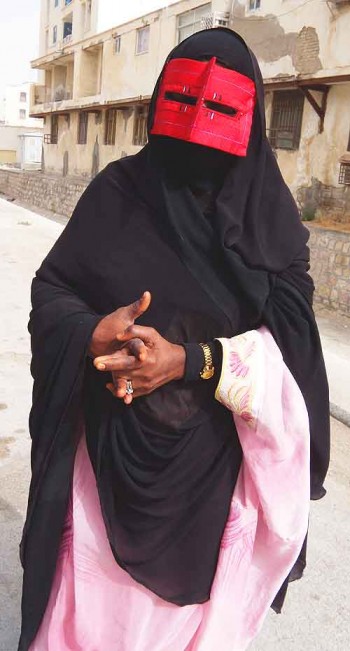
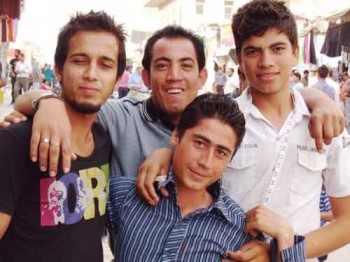
Iran
Bob Arno here, on our recent visit to Iran. The country has been in the news lately regarding the arrests of 30 persons accused of a U.S.-backed cyber war. We passed through last week, while also visiting Oman, Kuwait, Bahrain, and India. This is not an in-depth analysis about the stability of the present government in Iran or what lies in the future regarding its precarious relationship with Europe, Israel, and the U.S.; simply some observations from a short visit. [Way below!]
I first visited Iran in the mid-sixties as a young entertainer, performing in a shabby nightclub in Tehran. The booking was for two months and quite typical of the kind of engagements I was getting all over the middle East in those years, in Beirut, Cairo, Dar Es Salaam, and Teheran. These clubs were basically a front to sell alcohol and what were then called “consummation girls.” Even today, Lebanon advertises for girls to work as dancers and consummation hostesses in clubs across Lebanon.
The nightclub shows were simply an excuse for the management to have a license and to be allowed to stay open in a Shari’ah society. These were tough audiences, not especially interested in a young Swedish comedy performer, but the novelty of pickpocketing was intriguing and different from the usual fare of belly dancers, jugglers, dance teams, and singers. My show at the time was rough around the corners and I hadn’t yet acquired the confidence or slickness which later became my trademark and is essential to being a good pickpocket. With a few simple pickpocketing stunts I was able to bamboozle this nearly-ninety-percent male crowd and hold their attention.
Halfway through my booking, the club management informed me that I had been invited to the palace to do a private show for the Shah. No, there was not going to be any extra fee; this was an invitation to entertain the royalty (as if I were a court jester), and I should consider myself honored that his highness the Reza Shah had requested my services.
My manager at the time was a British show-business entrepreneur—Lord Anthony Moynihan. Moynihan was married to his second wife (he would eventually be married five times), a Pakistani belly dancer called Princess Amina. A diva of considerable proportion and a nightclub attraction with great popularity throughout the Middle East, she always guaranteed large audiences. Lord Moynihan was in Teheran, together with Princess Amina, who was performing in the same venue as myself. There have been many colorful stories written about Princess Amina. The most accurate one was written in 2002 in The Daily Times (of Pakistan) by Kaleem Omar.
Lord Moynihan was instrumental in structuring my career and coordinating my early bookings from the mid- to late sixties, culminating in several gigs at the London Playboy Club run by the infamous Victor Lownes. We parted ways in early 1970, when the Lord became one of the most wanted men in the UK for financial fraud. I, too, had long suspected Moynihan of “unusual” business practices, but I was never able to nail him with evidence, despite our close association. I finally got hip to his shenanigans when Victor Lownes told me that Moynihan could no longer enter the club premises, because he had been caught operating a cheating syndicate, pushing roulette chips over the table lines, with sophisticated diversion techniques involving beautiful girls leaning and shading the line of sight of the dealers. I don’t know who learned most from whom during our eight-year relationship. But that’s another story. And another post.
The Lord, Princess Amina, and I were brought to the Palace in downtown Teheran and invited to dinner. No, not with the Shah and Farah Diba, but at a separate table in a different room. Most memorable were the table settings, the porcelain, and the gold utensils. For a young impressionable Swede this was certainly a first.
A security adviser soon told me to enter the sitting room and do my show. Gathered on a large sofa were the Shah, Princess Farah Diba, King Hussein of Jordan, and his young wife, Queen Noor. But there were parameters. I was firmly instructed not to touch the Shah during my performance. How does one do pickpocketing if he’s not allowed to touch his subjects? Further on, the Shah wore a gold Rolex Presidential watch—at the time one of the most expensive watches in the world, and certainly not something that I would experiment with. The only thieves who are able to lift Rolexes are in Naples, Italy (then and now), and their technique is most certainly not appropriate for light dinner entertainment in a royal setting. I had to resign myself to some other table magic routines, which were my usual fallback material when all else failed. My evening with the royal rulers in the Middle East was not a success to boast about. I never ripped off the Shah of Persia. Well, not the official way.
And now we go forward, to the present day. I haven’t been back to Iran since the sixties. Today, hopefully, I am more astute at reading security trends and the political winds. I especially wanted to talk to ordinary young people about their feelings on Iran now and how they see their future in relation to Europe and the rest of the world. I expected to see parallels with Turkey, where the dialog about joining the European Union is intense, if not conclusive. Our first destination was Bandar Abbas, a city of around 370,000.
Driving through the center of the town I noticed an abundance of graffiti, or recently overpainted graffiti. I was curious about whether the slogans or messages were political, and for or against the government. I got the most amazing replies to my questions—mostly outrageous explanations, with no grounding in reality. For example: people are allowed to advertise for a month on the walls and then the municipalities paint over the walls to allow for new messages.
Or, an even better explanation: young people are encouraged to express themselves artistically on the walls, and then they are repainted for new creative expressions. I could not find a single person who would insinuate or say that these were angry statements from the opposition which had been removed or painted over by the authorities. End of that story.Â
But I did find several people in their mid- or late twenties who proclaimed that most of the young people hated the present regime, that they were robbed of their election, and that nobody cares or pays any attention to Mahmoud Ahmadinejad. True, these were people who spoke English and had a good education. Had I been out in the countryside and had a similar conversation with farmers, I might have gotten an entirely different story.
The most significant reflection I can pass along is how friendly everyone was, regardless of where we walked. We were obviously a novelty to the people, but there was absolutely no anti-American mood expressed or observed anywhere. People were genuinely friendly and open, and wanted to communicate and interact. There are many countries around the world where we Americans are sneered at, or receive a cold reception; Iran, at present is not one of them. That is not to say that the regime is not presently jockeying and manipulating world opinion. They are facing an embargo or trade sanctions in the UN, and perceptions of European visitors, tourists, or business travelers can shape the dialog.
We did notice civilian dressed security personnel following us from time to time, when we traveled and stayed with a group of other Americans, but mostly we were on our own and without escort, supervision, or secret surveillance. We spotted a few young clumsy pickpockets on the perimeter of a large crowd that had gathered around a troupe of shady “three card monte” men, operating just like they do in the rest of the world—spotters, shills, and a main operator. And, as usual, they scattered when a motorcycle with two cops approached.
In the souks we saw many social subgroups in their traditional garb. One should certainly not point a camera at these conservative women without permission. Some gave us the okay; others declined. Yet others struck unbidden poses and begged to be in our photos.
Iran is clearly at a turning point this year. It will be interesting to see the developments the next six months. Because I recently wrote about the Mahmoud Al Mabhouh killing in Dubai, I will conclude this post with an observation about Dubai, and its latest chess move: barring entry to any person with an Israeli passport. There has been a lot of speculation about whether this presumed Israeli operation was sloppy, arrogant, or ill-informed of the quality of the surveillance equipment. Senior analysts in the intelligence communities have expressed conclusions that they must have underestimated the advanced surveillance technology in Dubai. Security guru Bruce Schneier opened his recent Crypto-Gram newsletter with an interesting summarization.
I recently spoke with Samuel Lewis, former Ambassador to Israel for eight years during the Carter and Reagan years (and later director of the State Department’s Policy Planning Staff during the Clinton years). Ambassador Lewis has a deep understanding of the Iran-Israel conflict: he too thinks that the Israeli Mossad had underestimated the Dubai technology advances. That is, if the Mossad are the people behind the assassination. My own theory on this is that the Israelis wanted to send a clear message both to Dubai and its banking system, and to HAMAS. The software and the technology going into the camera surveillance systems must surely be well-known to the Israeli intelligence community. In weeks to come, we’ll hear more interesting revelations about the Dubai affair.

